Latest News
November Peer Support Calendar
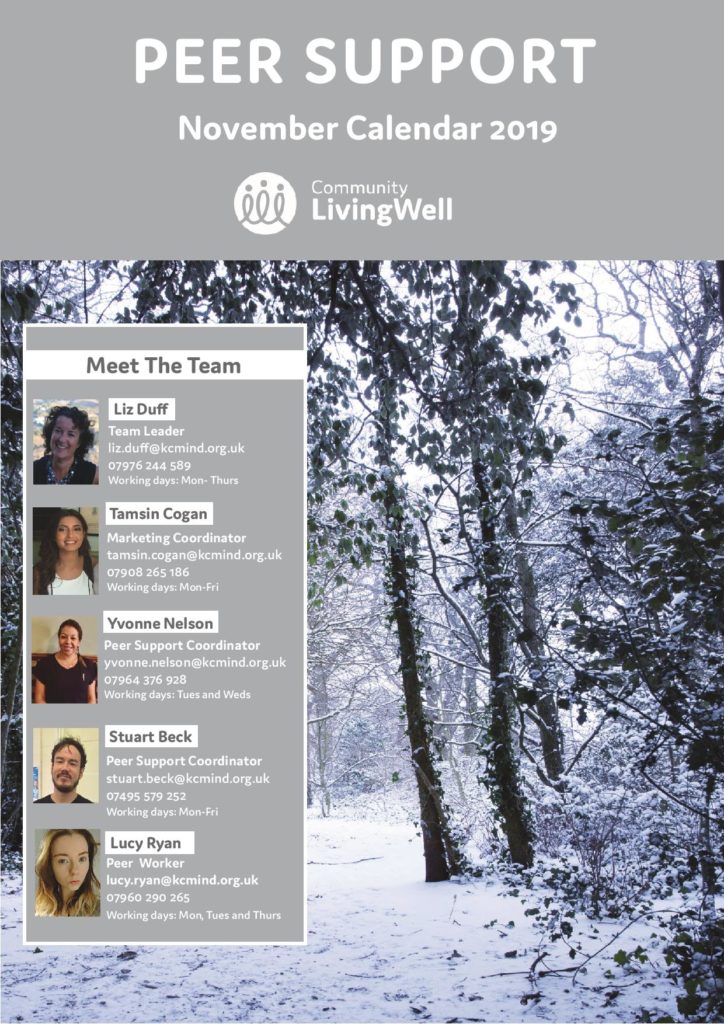
Welcome to the November Peer Support Calendar
We have a wide range of activities and groups on offer this month for our members. Highlights include a trip to Winter Wonderland and a weekend visit to Kensington Palace. All our groups are underpinned by the Five Ways to Wellbeing: Active, Connect, Give, Learn and Notice.
New Members
Are you new to Peer Support and looking for company this winter? Join a friendly Peer Support group and connect with like-minded individuals in an enriching and positive wellbeing environment.
If you are just starting to find your feet in the service, we understanding that joining new people at our groups can feel daunting. To help joining be less stressful and reduce your worries, we can offer you a one-to-one introductory meeting on a Monday Afternoon at the Community Hub at St. Peter’s Church, Kensington Park Road, W11 2PN. Afterwards, you will also have the opportunity to experience our weekly hub. This Monday group is a place for laughter, music, companionship, light snacks and a warming cuppa. If having a slot with a Peer Support coordinator could help you to try out our service, please email us at [email protected].
We hope you enjoy our November Peer Support Calendar. To attend a Peer Support group or book a one-to-one introductory meeting you must be registered with Peer Support. To refer yourself please complete this quick online form or call 020 3317 4200.
Find out more about Peer Support
Author: Tamsin Cogan
Category: Peer Support
Posted on: 1st November 2019
Every Mind Matters Platform
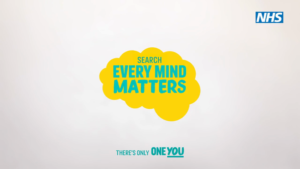
Good mental health and well-being is crucial. It means we’re able to lead happy and healthy lives. Yet it’s possible that any one of us can be affected by poor mental health and well-being at any point.
We’re supporting Every Mind Matters, a new mental health platform launched by Public Health England in partnership with the NHS.
How is your health? The online tool aims to help people take simple steps to look after their mental health so they feel better prepared for life’s ups and downs. Endorsed by the Royal College of General Practitioners, the evidence-based platform enables users to create a personalised action plan, therefore recommending self-care actions to deal with stress, boost mood, improve sleep and feel in control.
These include:
- reframing unhelpful thoughts
- breathing exercises and,
- increasing physical activity
If you’d like to access the online tool, visit One You Kensington and Chelsea.
Find out more about Every Mind Matters on the NHS website.
Author: Tamsin Cogan
Category: Community Living Well
Posted on: 28th October 2019
Anxiety and Depression Support Group

Our Peer Support programme includes a structured Anxiety and Depression support group that aims to bring people together who can share their experiences, of anxiety, depression and other aspects of mental health difficulties that affect wellbeing. Self-help groups provide our members with the opportunity to help and support each other as equals, exchange ideas and tips, share their personal stories, teach, learn and grow together. It’s your chance to talk without being judged, an opportunity to learn about how others in similar situations manage their symptoms, and to connect and feel encouraged by people who know what it’s like to feel the way you do.
Peer Support members, Steven and Jenny, share their experience of the Anxiety and Depression support group and how it has benefitted their wellbeing.
How did the two of you meet?
Steven: I met Jenny at a Community Living Well Anxiety and Depression Peer Support group. After suffering from depression for many years, I felt very isolated. I went to see my GP and was immediately referred to the Community Living Well service. My support worker and I put together a plan of action to take advantage of the services on offer including primary care liaison support, peer support and one-to-one support. I was in a very bad way at the start but when I met Jenny, I was starting to feel more able to express how I was feeling. I could recognise that Jenny was under a considerable amount of stress which I could relate to. We supported each other through the different issues we brought to the group.
Jenny: Before I joined the group, I had been desperately trying to find support. I found one of the Peer Support brochures at the St Charles Centre and it immediately appealed to me as I had been looking for a talking group. When I met Stephen, I immediately felt that we were on the same page. We had both suffered for so many years yet wanted to be survivors. There was a calmness about you that I found very comforting. I am constantly in awe of the wisdom you share with the group, and you have said so many things that have really stuck in my mind.
What brought you to the Anxiety and Depression support group?
Steven: From a young age, I had always felt like I was an observer. I was withdrawn, living in my own head and rarely engaged with others. For that reason, I wanted to be in a group so that I could get the chance to say what I have always wanted to say. I felt the need to share my struggles with a variety of people so that I could get a range of perspectives on my situation.
Can you remember what it was like attending your first support group?
Jenny: I was in a very bad place when I first attended the group. I remember the sensation of coming out afterwards and thinking that it was very helpful. There were many tears and it felt like the beginning of a journey. I have friends who are sympathetic, but it was empathy that I had been searching for. I remember thinking that we may all have different struggles, but we all suffer the same pain and that is why we can support each other.
Why do you come back to the Anxiety and Depression support group on a regular basis?
Jenny: I appreciate the depth that comes with attending a regular group. I like the fact that you can pick up from where you left off the week before. It’s nice to have a core set of people present. I feel like I have made friends with the members.
Steven: On the one hand, I am pleased that as time has gone on, I have started to get to know people better. Previously, when relationships were forming with others, I had a habit of retreating in order to protect myself. The desire to talk was bursting through me but I felt blocked off from others.
On the other hand, I appreciate the opportunity to talk to an anonymous person. I like seeing new people at the group as they bring a new perspective and I gain reaffirmation from their experiences. The group is a mixture of genders and ages. I think this is important as its good to have a collection of people who are from different backgrounds. We come together from different walks of life. Yet in that moment,we talk about things you would never talk about with your nearest and dearest. You display emotional honesty by talking about what is really going on beneath the surface. Then you disperse and go off and live your life with the knowledge you have learnt from the group.
Jenny: It is nice to know that the group is there whenever I need it – it isn’t time limited. It can be anxiety inducing to know that support is coming to an end as you feel pressure to cover everything in a short space of time.
Steven: Yes, I agree that the fact that it has no end point is a fundamental benefit. It is reassuring to know that if something was to go wrong a few months down the line, I could access the group again.
How do you connect with other people in the group?
Jenny: I find it comforting to know that we’ve got each other’s backs. Members that I have spoken to didn’t feel like they had that before. I connect with them because they also feel things very deeply.
Steven: There are people there that you just click with; those who you can communicate with just through a look. Meeting kindred spirits opens up your world and makes life more fulfilling.
What have you learnt from the Anxiety and Depression support group?
Steven: Being in a group and hearing something you have already learnt or previously thought has its own power. It cements your understanding and confirms the belief.
With the benefit of hindsight, what do you wish you knew earlier on in your journey that you know now?
Jenny: I wish I had known about this group sooner. The fact that it is continuously available makes all the difference.
Steven: Yes, knowing how much it can benefit you really makes you think, why delay in signing up? Don’t do it so late in the day! Because then you are left trying to catch up on what you have missed out on.
The Anxiety and Depression Peer Support groups take place weekly across the borough. To find out more information please email [email protected].
If you are experiencing some of the issues mentioned…
To attend an Anxiety and Depression support group you will need to refer yourself to the Peer Support service. Please fill out the form available here or call 020 3317 4200.
This story was originally published in the Autumn 2019 edition of the Community Living Well magazine. It has been edited for website purposes. Subscribe today to receive inspirational stories of recovery, just like Jenny and Steven’s, straight to your inbox, four times a year!
Author: Tamsin Cogan
Category: Peer Support
Posted on: 24th October 2019
Autumn 2019 Magazine
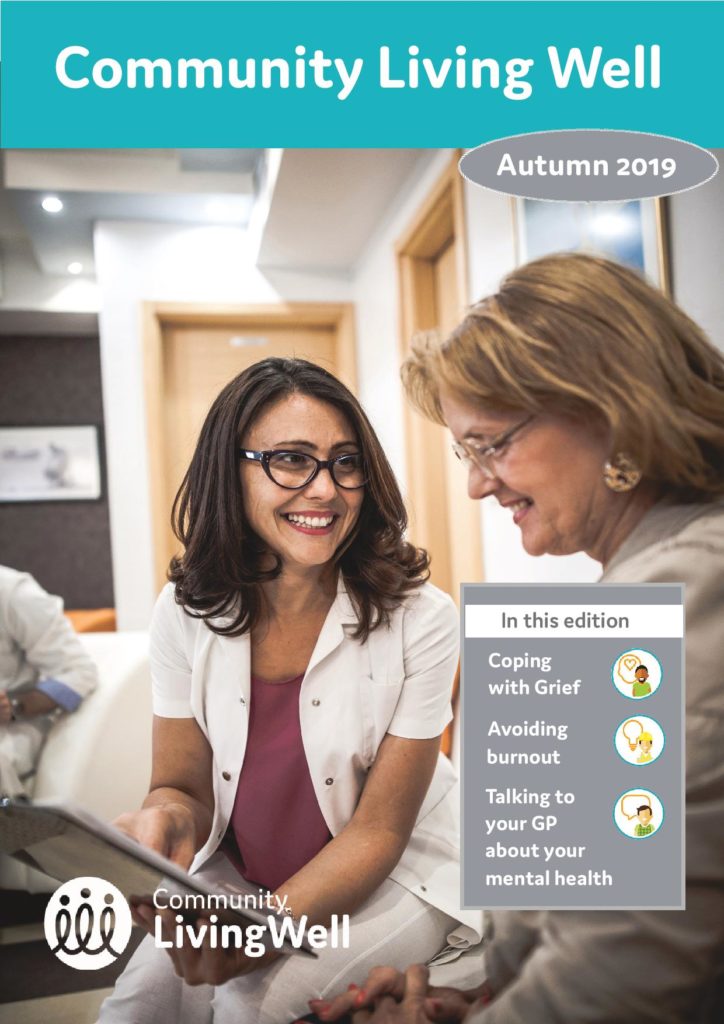
Welcome to our Autumn 2019 Magazine!
We all experience times when we’re struggling or not coping as we might like, or where our circumstances and life events make things extremely difficult and challenging. It’s part of life, and it’s OK to not be OK.
We understand that searching for mental health support may not feel easy. With an abundance of information out there, it can be hard to know where to begin and who to turn to for reliable advice.
That is why we have dedicated the Autumn 2019 edition of our magazine to those who are looking to access professional support. We hope you find information that helps you take the first steps towards a more hopeful and happy future. The articles include how to talk to your GP about your mental health as well as tips to help you support someone with a mental health problem.
When you’re going through a tough time, it’s hard to imagine an end in sight. But seeking help can be an instrumental steppingstone in your recovery journey. Check out the moving and honest patient stories featured in this edition that we hope inspire you to pick up the phone or reach out to us if you are struggling.
Plus…
From grief and burnout, to the brave new world of mental health technology, this edition is also filled with content that aims to help you on your quest for improved health and wellbeing. When you finish this edition, I hope you’re left feeling informed, uplifted and understood. If you’re inspired by what you read and want to share your own story, remember you can contribute to the magazine by emailing me, Tamsin, at [email protected]
Community Living Well is a mental health service for those registered with a GP in the Royal Borough of Kensington and Chelsea, or the Queen’s Park and Paddington areas of Westminster. The services on offer include talking therapies, support groups, help with employment and support with debt, housing and benefits issues. Self-referrals can be made here. For more information please call 020 3317 4200.
Author: Tamsin Cogan
Category: Community Living Well
Posted on: 17th October 2019
How Counselling Helps with Grief
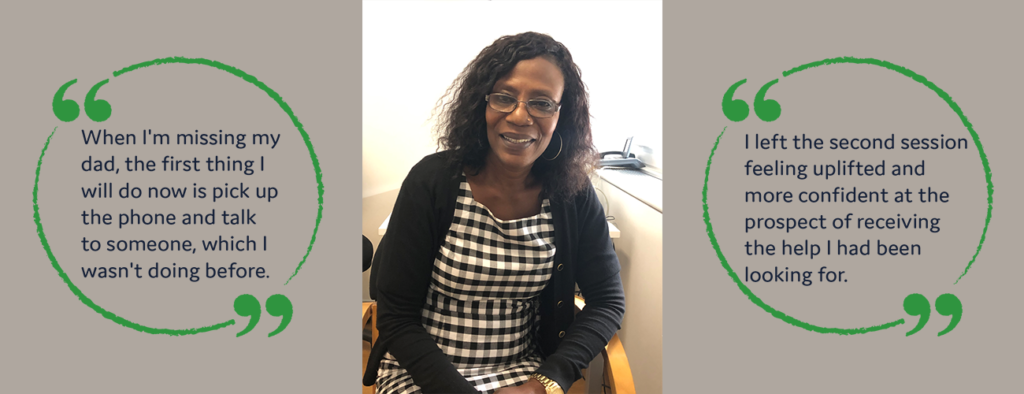
Grief often comes in ebbs and flows but it can be particularly painful around Christmas time. After experiencing grief for many years, Grace spoke to one of our counsellors from the Talking Therapies service. Georgina encouraged her to reach out to and accept support from loved ones when coping with the impacts of a bereavement.
What difficulties led to you being referred to CLW Talking Therapies?
I had accessed the Community Living Well service before and received low intensity CBT treatment. This therapeutic intervention helped me with my worries and negative thoughts. CBT had also increased my daily movements through introducing me to gardening. After the course ended, I was fine up until the run up to Christmas 2018. It was then that I started to not feel like myself. I was easily distracted, restless, getting upset, having sleepless nights.
Negative thoughts about people were plaguing my mind. I felt unable to trust others and was experiencing a constant fear that people were going to hurt and upset me. This left me feeling hopeless and useless and I couldn’t talk to people without crying. I went to my GP who asked me a few questions and then gave me some questionnaires. She was the first person to say to me “You have depression and anxiety and I will refer you for support.”
What happened after you were referred?
I got the triage call where they assessed me over the phone. It was difficult to talk about myself, but they were understanding and sympathetic to my situation. They felt counselling was more appropriate as my issues were related to what had happened in my past and its impact on me now.
How did you find counselling?
After my first counselling session, I didn’t want to come back again because I found it hard to talk to a stranger. However, I persevered and turned up the next week and consolidated what we discussed the week before.
I left the second session feeling uplifted and more confident at the prospect of receiving the help I had been looking for. By the third week I felt more relaxed and less tearful.
Did counselling help with your grief?
Without a shadow of a doubt. I started to feel much lighter, like a huge weight had been lifted off my shoulders. I realised how much I’d gone through after talking about things that I’d never told anyone. When you confide in someone else it feels like a confession, you start to realise the load you’ve been carrying on your back.
What has the effect been like on your self-esteem?
That I’m not a bad person. I’ve got good friends around me, people I can talk to. I also noticed that I was always putting myself down and feeling worthless. I never felt like I was doing enough for others, but by the end of the course I started to realise that I was doing enough, and that it’s okay to accept support from others.
A pattern began to emerge as I noticed that my depression tends to crop up in the run up to Christmas. In the past 2-3 years I can see that Christmas has been a trigger for a dip in my mood. It is when I miss my Dad the most and wish that he was still alive so that we could be in Ghana, going to church in our new clothes. I’ve learnt that talking really helps. When I’m missing my Dad the first thing I will do now is pick up the phone and talk to someone, which I wasn’t doing before.
Do you have a plan for maintaining your progress?
I live an active life; I’ve been walking and keeping in touch with friends regularly. If I feel sad, I no longer wait for someone to come to my rescue by phoning me. Instead, I call them to say hello. I’ve lost friends in the past because I didn’t feel like I could talk to anyone. I’ve now spoken to people about my depression and anxiety and even though they were surprised, it makes them more determined to reach out if they haven’t heard from me.
What advice would you give others whose grief are complicated by psychological issues?
Please don’t wait until you’re feeling really low and tearful, go and ask for help. There’s nothing to be ashamed of, all you need to say is, ‘I need help,’ and briefly describe your symptoms. Your GP will be able to work out how they can help you.
If you are experiencing issues related to grief…
Refer yourself to the Talking Therapies service, please fill out the form available here.
To learn more about the Talking Therapies service, click here
This story was originally published in the Autumn 2019 edition of the Community Living Well magazine. It has been edited for website purposes. Subscribe today to receive inspirational stories of recovery, just like Jenny and Steven’s, straight to your inbox, four times a year!
Author: Tamsin Cogan
Category: Talking Therapies
Posted on: 14th October 2019
World Mental Health Day
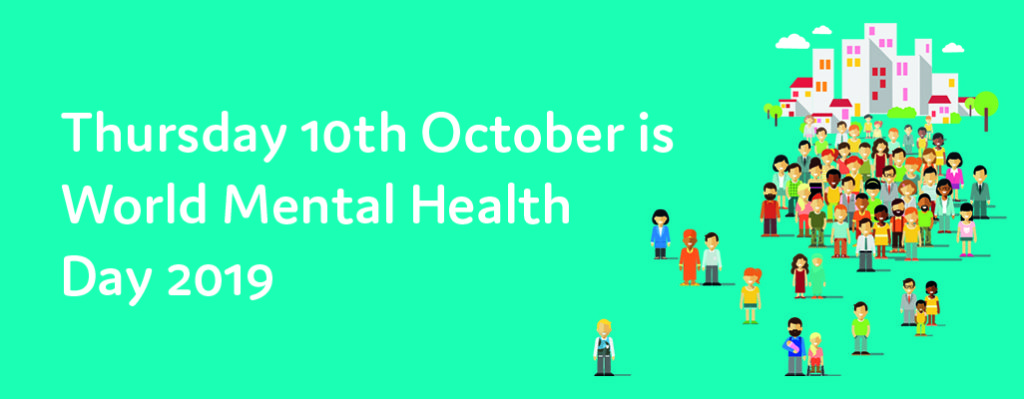
Mental health problems can affect anyone, any day of the year. However, World Mental Health Day is a great day to start looking after your own wellbeing. You can do this by accessing some of the free mental health support available to you.
Community Living Well offers a different kind of mental health support. It makes it easy for you, and anyone who cares for you, to access a wide range of clinical and wellbeing services. It brings people together from your local community groups, NHS and the voluntary sector in one service which will work alongside you and your GP to help you access the support you need.
The services on offer include talking therapies, support groups, help with employment and support with debt, housing and benefits issues.
You can refer to our service quickly and securely by completing our online referral form.
Author: Tamsin Cogan
Category: Community Living Well
Posted on: 10th October 2019
Your Suggestions into Actions
Your views are very valuable to us. They help us re-evaluate and refine our communication methods. They are also key to helping us make improvements and reach more people who may benefit from our service.
Your suggestions into actions
Last summer, we held a marketing feedback meeting with staff and service users which hosted conversations about our marketing materials. Thank you to those who attended for your useful comments and recommendations. As a result of that meeting, your suggestions have since been turned into actions. Details of these changes can be found in our ‘Your suggestions into Actions’ poster available here
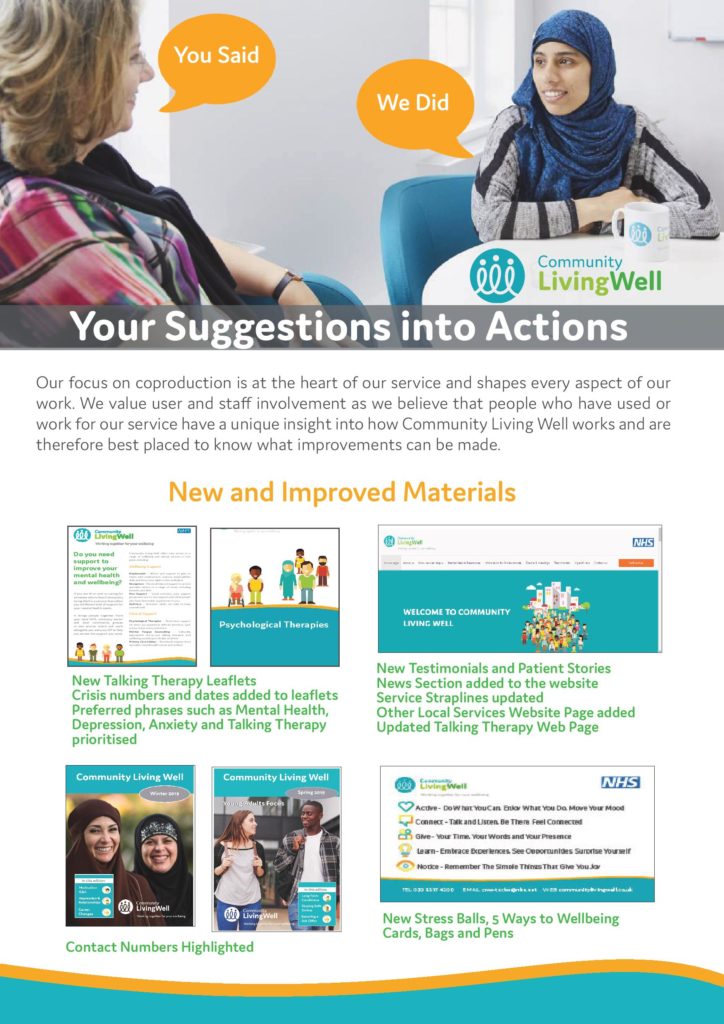
It’s not too late to share your thoughts!
Your feedback is always important to us. Coproduction is at the heart of our service and shapes every aspect of our work. If you have something to say about our website, leaflets or magazines – a compliment, complaint or concern – please contact our marketing coordinator, Tamsin, at [email protected]
Author: Tamsin Cogan
Category: Community Living Well
Posted on: 3rd October 2019
World Mental Health Day Event
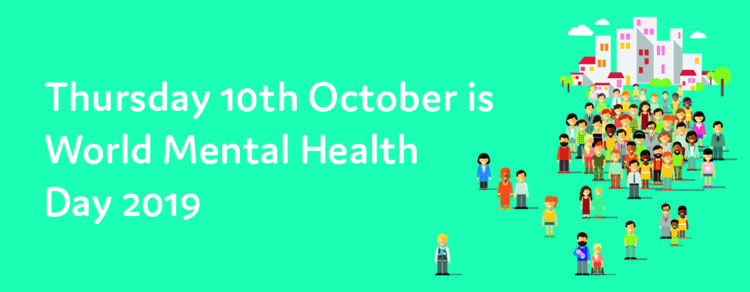
The Volunteer Centre Kensington and Chelsea are inviting local residents and wellbeing organisations to come together for a World Mental Health Day event at The Curve Community Centre, 10 Bard Road, Notting Hill, W10 6TH on October 10th from 4-6pm. Mental health problems can affect anyone, any day of the year, but 10 October is a great day to start looking after your own wellbeing by accessing some of the free support available to you.
The aim of this World Mental Health Day event is to provide you with information about local support and wellbeing services and to increase your connections and confidence to seek support. The event will be open to anyone, of any age, in the local community and is guaranteed to be very interactive with lots of stalls and activities for attendees to get involved with across the course of the afternoon.
Community Living Well will have a stall so make sure you head over for a chat with us. We will have plenty of leaflets and flyers available and there will be staff members on hand to answer any questions you may have about Community Living Well including how to refer into the service.
Please sign up to the event through the link.
To learn more about the Community Living Well service, click here.
Author: Tamsin Cogan
Category: Community Living Well
Posted on: 30th September 2019
How Cognitive Behavioural Therapy helped Rebecca
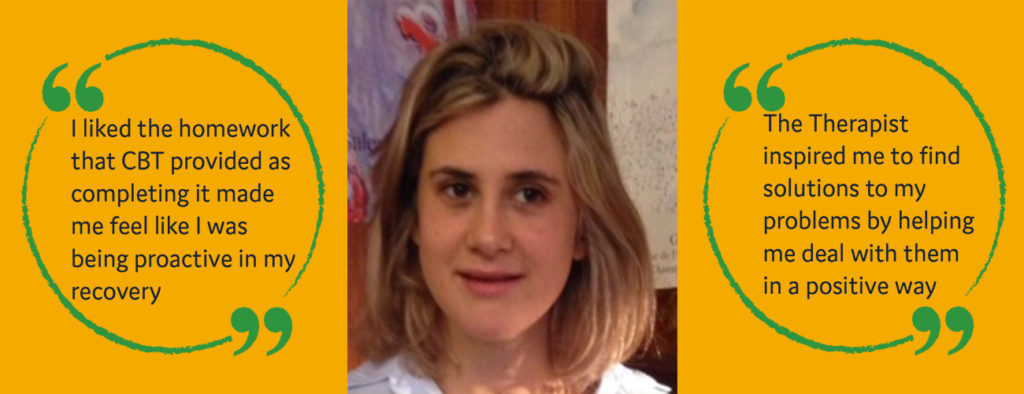
Rebecca had been experiencing symptoms of anxiety and depression after the death of a family member. Since completing cognitive behavioural therapy, she has found ways to challenge her negative thought patterns and adopt a new mindset.
The Community Living Well Psychological Therapies service offers talking therapy or counselling that can help you if you are feeling stressed, worried, anxious or low in mood. We offer a range of therapy options, all of which are effective treatments recommended by the National Institute for Clinical Excellence.
To sign up to the service, please click here
What led you to seek therapy with us?
Following a cancer diagnosis in the family and the breakdown of a relationship, I began to suffer with Anxiety and Depression. My GP referred me to Community Living Well about 5 years ago for similar issues and at the time accessed short-term help from their psychological therapies team. I got good results so felt confident about returning to the service for the second time. I was especially pleased that I was able to see the same therapist again as I felt very comfortable and safe talking to her
The therapist inspired me to find solutions to my problems by helping me deal with them in a positive way and breaking them down into smaller parts. Instead of just passively listening, she helped me to find practical ways to improve my state of mind on a daily basis. I started doing more exercise, writing a journal and making more of an effort to speak to people. Most importantly, I took time out to reflect on why I was feeling this way and to work on changing my negative thought patterns. I liked the homework that CBT provided as completing it made me feel like I was being proactive in my recovery
Did you overcome any particular challenges or obstacles before or during Cognitive Behavioural Therapy?
With my therapist’s help I learnt how to identify the negative voice inside of me. I began to recognise that the bad thoughts that had been weighing me down were a separate part of me rather than a reflection on who I was as a person. I was able to put up a barrier to stop them from getting in and I am now aware it’s just a voice that I don’t have to listen to.
How are you feeling now that you have just finished Cognitive Behavioural Therapy?
I found my sessions with the therapist to be very helpful. It was comforting at a time when I really needed support. I was reluctant to finish but at the same time I felt that she had provided me with all the tools I needed to carry on my journey alone and knew that the rest of the work had to come from me.
Do you have a plan for continuing your good work?
Yes, I will keep up the regular exercise and everyday awareness activities. I will also continue to work on not letting myself sink into negative thought patterns weighing me down were a separate part of me rather than a reflection on who I was as a person. I was able to put up a barrier to stop them from getting in and I am now aware it’s just a voice that I don’t have to listen to.
What advice would you give to others who are struggling with psychological issues and who may be nervous about asking for help?
I would encourage them to try and take the first few steps to recovery by visiting their GP. The stigma around mental health has noticeably declined in recent years. Asking a mental health professional for help is really just the same as asking them for help with a dodgy knee or back. The services are professional and empathetic, and they are there to help you through your lowest points.
Community Living Well is a mental health service for those registered with a GP in the Royal Borough of Kensington and Chelsea, or the Queen’s Park and Paddington areas of Westminster. The services on offer include talking therapies, support groups, help with employment and support with debt, housing and benefits issues. Self-referrals can be made here. For more information please call 020 3317 4200.
This story was originally published in the Winter 2019 edition of the Community Living Well magazine. It has been edited for website purposes. Subscribe today to receive inspirational stories of recovery, just like Jenny and Steven’s, straight to your inbox, four times a year!
Author: Tamsin Cogan
Category: Talking Therapies
Posted on: 19th September 2019
Talking Therapies and Community Living Services exceeding targets
CNWL’s Talking Therapies Service and the Community Living Well Service have helped over 26,000 patients to enter treatment over the last year, with 145,000 appointments offered on the phone or face-to-face. Many more patients have received digital therapy with telephone support offering an accessible way of receiving support and advice. The service has consistently exceeded the ‘entering treatment’ targets, and they’ve also exceeded the 50 per cent recovery targets, across all the Trust’s North West London services.
Read more here
Sign up to the Community Living Well Psychological Therapies service here
Author: Tamsin Cogan
Category: Talking Therapies
Posted on: 13th September 2019



